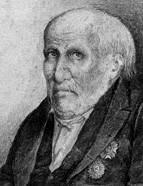

In 1793, he stepped away from teaching and returned to Lisbon with his family, ostensibly for health reasons. During this period, he became acquainted with Dom Rodrigo de Souza Coutinho, and in 1797, he obtained from the Prince Regent both his retirement as a professor and his appointment as deputy secretary of the Board of Agriculture and Commerce of Bahia. This period marked the beginning of the efforts that culminated in the publication of his first major work in 1801 , Princípios do Direito Mercantil [Principles of Commercial Law], the first two volumes of which appeared in 1798. In 1804, he published Princípios de Economia Política [Principles of Political Economy], in which he advocated for free trade and introduced the ideas of Adam Smith.
When the Portuguese royal family passed through Salvador in January 1808, José da Silva Lisboa is said to have influenced the decision to open Brazilian ports to friendly nations. While still in Bahia, he was appointed to a chair of "Political Economy" and invited to accompany the Court in its relocation to its new seat in Rio de Janeiro. From that point onward s , his influence on state affairs became enduring, marked by a prolific intellectual output across various fields. In particular, he excelled in "Political Economy," translating and popularising the ideas of Adam Smith and Edmund Burke, and producing original reflections that applied the principles of economic liberalism and Burkean conservatism to the Luso-Brazilian context.
Through Dom Rodrigo de Souza Coutinho, Lisboa was appointed in 1808 as a member of the Royal Board of Trade and a member of the governing and censorship body of the Royal Press . This institution became central to what can be described as the intellectual strategies underpinning the new Court. It is within this context that Lisboa’s first two historical works were produced: A Memória da Vida Pública do Lord Wellington [Memoir of the Public Life of Lord Wellington] (1815) and Memória sobre os Principais Benefícios del Rei D. João XVI [Memoir on the Principal Benefits of King Dom João XVI] (1818). Throughout King João VI’s reign in Brazil, Lisboa supported the strengthening of royal authority and the reformist project to establish a Portuguese—or Luso-Brazilian—empire, grounded in the notion of ending the colonial system and inaugurating a new governance model for the territory.
This work is financed by national funds through FCT - Foundation for Science and Technology, I.P, in the scope of the projects UIDB/04311/2020 and UIDP/04311/2020.
